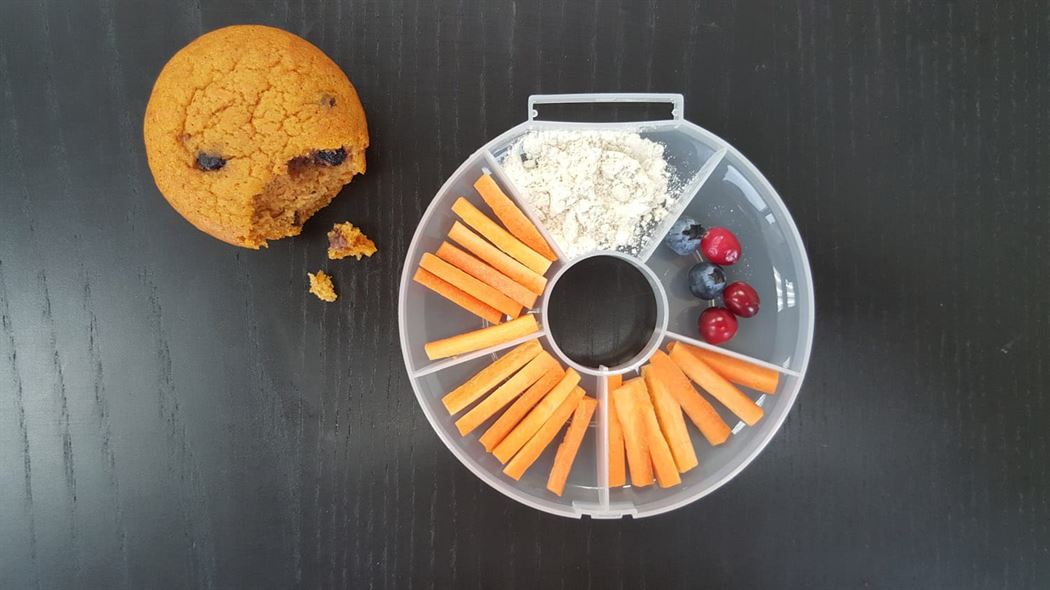Apps like Uber Eats and Grubhub on a smartphone can deliver food straight to your doorstep with a single push of a button in today’s world. Obtaining food from the nearest fast-food place has become easier, and so has neglecting one’s body from having a balanced meal. Vegetables have been replaced with juicy burgers and greasy fries, leaving only nine percent of Americans eating the required two to three cups of vegetables per day, according to Centers for Disease Control and Prevention (CDC). The phrase “Eat your greens” does not sound as convincing as it once did, especially to college students living on their own.

Garden Lites is a local New Jersey-based company that helped to develop the food development experience course at Montclair State University.
Photo courtesy of www.gardenlites.com
Nutrition and food studies graduate student Angela Morresi, 24, knows perfectly well the mindset of a college student in terms of food. She is strongly determined to get individuals to include more vegetables in their diet, along with six other graduate students who shared a food development experience course at Montclair State University.
The objective of the course is to create a hands-on experience in developing veggie-based products that are vegan and gluten-free while also learning about the manufacturing process and budgeting.
“I signed up for this class to get hands-on experience in food science with a company in the industry and to get familiar with new food ingredients,” Morresi said. “It’s been a great way to learn what product development is like in a classroom setting. There are limited food science classes at the graduate level, so this class was an amazing opportunity.”
The course officially started in the spring of 2018 after Alison Javens, a clinical specialist of nutrition and food science studies at Montclair State, was approached by a local New Jersey company called Garden Lites that develops and sells veggie-based products in stores such as Costco, ShopRite, Target and Stop & Shop.
“What happened was that I met with Andy Reichgut, who is [the executive vice president of sales and marketing at] the company Garden Lites,” Javens said. “I was talking to him about our food science program, and he became very interested. He had been wanting to innovate with a product development class at the university. So, I made the introduction between he and Dr. Kerrihard, and they hit it off. Then the course was born.”
Dr. Adrian Kerrihard is the professor in charge of the course and worked hard with his colleagues to help establish the program at the university. He originally met with Reichgut to discuss the possibility of collaborating. However, within seconds of both men bouncing ideas off of one another, Kerrihard thought it would be a great fit for Montclair State students.
Reichgut felt the same, especially after he met Kerrihard and shared like-minded ideas.
“Montclair State has a great track record of developing high-quality food scientists and nutritionists,” Reichgut said. “So, we met with the professors and faculty there and talked about what we are looking for and we thought that it could be a great learning environment for students when we saw their capability and the quality of students.”
Through the partnership with Garden Lites, the course was able to fully develop. After selecting seven promising students, the students were broken up into teams in a kitchen located in Avenel, New Jersey.
Each team was given instructions to think of different ideas for prototypes with strict instructions that were, according to Reichgut, that vegetables are the first and primary ingredient. Apart from this, the teams were given the objective to create a high protein vegetarian in either breakfast, snacks, meals or veggie-based desserts. They also had to design new formats for veggies to seem more appealing to eat.
Students have already been successful in creating several veggie-based products, like doughnut holes, brownies and a breakfast bowl. Apart from this, many of the participants expressed that throughout the process they learned a lot about the food industry.

Students of the food development experience course created a chocolate muffin from various veggie ingredients.
Photo courtesy of Diane Lill
Carol Majkrzak, a 29-year-old nutrition and food science major, was one of the selected students and felt more confident in her abilities to produce goods after taking this course.
“Really, you don’t understand what you’re being taught about making or developing food until you have to do it yourself,” Majkrzak wrote via email. “A lot of people don’t get this experience until they are already working. I feel much more secure in my abilities after having taken this class.”
Kerrihard explained that the purpose was to target graduate students that wanted more experience in the field of food production without leaving the classroom.
“A common experience for students is to graduate, get a job and then suddenly discover there are so many things they have yet to learn,” Kerrihard wrote via email. “But by that point, they are no longer surrounded by teachers and it’s often unclear who they can ask for help and education. I hope this course has helped put [the students] in a better version of that situation.”
Kerrihard hopes to continue the program in the fall semester of 2018.
“It looks like the next step right now is for some of the students to return next semester to finish the development of the products they have made, which I am very excited about,” Kerrihard wrote via email. “Beyond that, I expect we will do something similar for the next batch of motivated food science graduate students that come to our department.”



